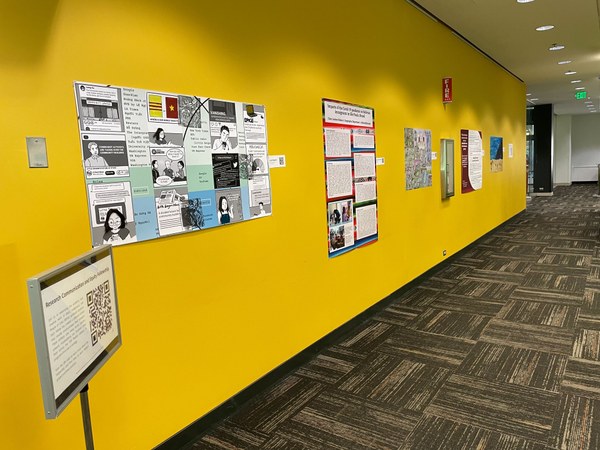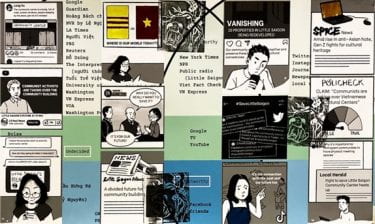
September 13, 2023
Celebrating BIPOC Graduate Student Work
Negeen Aghassibake, Data Visualization Librarian and
Madeline Mundt, Head, Research Commons/Social Sciences Liaison Team Leader
The Research Communication and Equity Fellowship showcase at the UW Libraries’ Research Commons celebrates the academic and creative work of Black, Indigenous, and People of Color (BIPOC) graduate students.
The Research Communication and Equity Fellowship supports creativity, imagination, and excellence in conveying UW graduate student research to the public through a physical and virtual exhibit. The Fellowship began with the goal of creating a more equitable environment for all students and making space to celebrate the scholarship and community of BIPOC graduate students. To work toward this goal, each of the five Fellows created a physical artifact that visually communicates their research and the artifacts are exhibited in the Research Commons. While these artifacts are informed by Fellows’ graduate work, they have been created especially for this program which provides a unique opportunity to blend research communication and visual creativity.

the Fellowship gallery wall in the Research Commons
About their work, Fellow Sarah Nguyễn says: “I decided to create this multimedia collage to make my research more accessible to the community that I’m most concerned about, Vietnamese immigrants, refugees, and intergenerational communities within.”
The Fellowship artifacts are on display in the Research Commons, a library space for interdisciplinary, innovative, and collaborative student work. Components of this ethos, along with the UW Libraries’ strategic goals around advancing research for the public good and creating equitable environments, have informed the development of this fellowship. In particular, we highlight graduate students doing interdisciplinary and collaborative work, open work (for example, open access publishing or projects with public scholarship components), and digital scholarship methodologies/tools (for example, data analysis, mapping platforms, or digital humanities work).
Learn more about the 2023 Fellows and view their work in more detail:
- María P. Angel, School of Law, Ph.D. Program
- Sarah Nguyễn, Information School, Ph.D. program
- Melissa Leon Norena, Biology, Ph.D. Program
- Clara Lemme Ribeiro, Geography, Ph.D. Program
- Jazzmine Waugh, Biology, Data Science Ph.D. Program
Fellow Sarah Nguyễn shares some of her reflections on the program:
For the first 2.5 years of the PhD program, I have been blessed to focus my energy and research interests to better understand the world of mis- and disinformation, or what I prefer to call information disorder, particularly within the Vietnamese diaspora. In other words, I’ve been trying to understand why my elders have such stark political ideological perspectives from me and how we can communicate and share information with each other to better understand each other’s perspective. From there, I have centered community collaborations to explore information diet, trust, and both online and analog information transmission practices among Vietnamese peoples. While I’m proud of being able to co-author and publish multiple scholarly articles about this research, I knew I had to translate this work not just from English to Vietnamese language but also make the dense and theoretical research legible to people like my parents, aunts, uncles, and sisters who have no interest nor the capacity to read 30 page single-space scholarly text. This led to the visual imagery that we see in the poster I collaged.

Learn more about Sarah’s work and read the accompanying bilingual illustrated booklet.
This Fellowship was funded by a “Friends of the Libraries Award” from the Friends of the UW Libraries, which covered awards for the Fellows, artifact printing costs, and reception refreshments.
